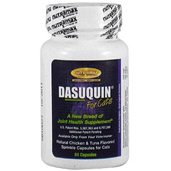Many cats today are not at a healthy
weight. In fact, a study conducted by the Association for Pet
Obesity Prevention in 2009 showed that approximately 58% of cats in
the United States were overweight or obese. This was a 5% increase
from what a similar study found in 2007.
Why Should Pet Owners Be Concerned?
A few extra pounds may not seem like
that big of a problem, but many pet owners misidentify their cats as
being of normal weight when they are actually overweight. So if
you think that your pet is only a "little" overweight, there is
a very good chance that she is actually dangerously overweight or obese.
"If you have tried to put your cat on
a diet and she has not lost any weight, talk to your veterinarian."
Many health conditions are seen more
frequently in overweight cats, including:
- Diabetes mellitus
- Osteoarthritis
- Hepatic lipidosis (a type
of potentially fatal liver disease)
How Do I Know If My Pet Is Overweight
Owners should routinely examine their
cats to determine if they are maintaining, gaining or losing weight.
Using a scale is ideal to track small changes, but you should also know
what a healthy weight looks and feels like. Have your cat stand
up and use the following check list to determine whether or not she
is at an ideal weight.
- The ribs should not be visible
but should be easily felt when you lightly run your hands along her
sides.
- Looking from the side, her
abdomen should be "tucked," meaning that her chest is closer to
the ground than her belly.
- From above, she should have
an hourglass figure. Her chest and hips should be wider than her
waist.
Of course some breeds or individuals
may vary slightly from the above and still be very healthy.
Consult with your veterinarian if you have any questions.
Home Care
Cats that need to only lose a few pounds
can usually do so if their owners are dedicated to helping them.
Increasing the amount of exercise that a cat gets is very helpful but
can be difficult. Make use of kitty fishing poles, laser pointers
flashed on the floor and walls, or even train your cat to walk on a
harness and leash outside. If your pet has osteoarthritis being
more active might make her sore. In these cases, joint supplements can help keep her comfortable and allow her
to get the exercise she needs.

Try to reduce your cat's overall
caloric intake by about 15% percent. Start by strictly limiting
treats. These can add a surprising number of calories to your
cat's diet when they are given regularly. Consider switching
your cat to a "diet" cat food since most pets are not satisfied
if they are simply given 15% less of their current food. Examine
the labels carefully. There is little regulation as to what can
be called a "diet" cat food. In some cases, what is described
as such may actually have more calories per cup than what you are currently
feeding.
In general, home-cooked diets are not
appropriate for cats that are overweight unless they are prepared from
a recipe formulated by a veterinary nutritionist. If your cat
will only eat a home-cooked diet, multivitamins will be necessary. Another way to get
the benefit of fresh foods without the extra calories and time and effort
spent preparing them, is to add an enzyme
supplement to your pet's
diet.
Veterinary Care
If you have tried to put your cat on
a diet and she has not lost any weight, talk to your veterinarian.
He or she can examine your cat and determine how much weight she needs
to lose and the healthiest way to go about doing so. Overweight
cats need to lose weight slowly to avoid a potentially serious liver
disease caused hepatic lipidosis, so it never hurts to have your vet
involved. If necessary, he or she can also provide you with foods or petmeds that are so calorie restricted they are only available through veterinarians.
The above is provided for information purposes only and should not be used for the diagnosis or treatment of any condition.
This information does not cover all possible variables, conditions, reactions, or risks relating to any topic, medication, or product and should not
be considered complete. Certain products or medications may have risks and you should always consult your local veterinarian concerning the treatment of
your pet. Any trademarks are the property of their respective owners.